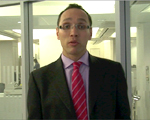Is Roger Bootle being overly positive? That’s not a question that gets asked very often. But his prognosis for property is bound to prompt that reaction from some in this industry.
In a paper sent to clients this week before the Bank of England announced a further £75bn round of quantitative easing on Thursday, Bootle and his chief property economist Ed Stansfield updated their outlook for the industry.
“We do not think that the outlook for growth and employment has yet deteriorated to a level that merits a downgrade to our UK commercial property forecasts. Rather, we feel that the commercial property market, viewed as a whole, is fairly well placed to withstand a protracted period of weak GDP growth. Property prices should stay broadly flat in 2012.”
Among those who will disagree with that assessment are delegates at this week’s Expo Real event in Munich. It’s a key test of property’s temperature each autumn and the black cloud of the eurozone debt crisis hung heavily over this year’s gathering.
Bankers were seen pulling in their horns, talking of no substantial lending in this cycle. Talk of overdevelopment in the City of London was rife among the UK contingent, with predictions of mothballed schemes and occupier refurbishments rather than major moves expected.
Nevertheless, look at Expo through a Stein half full and a slightly different picture emerges. Banks are lending to the right companies and against the right assets. Witness Grainger’s agreement of £890m debt facilities this week.
In some of the troubled eurozone countries, the green shoots of recovery are perhaps emerging. Research from Savills this week reported that the Dublin office market is showing the strongest level of take-up since 2008.
Conservative Party conference
That said, the week’s other big event, the Conservative Party conference, has done little to lift the gloom. Almost 70% of respondents to this week’s EG/Colliers International Big Question poll said that despite – or perhaps because of – the noises coming from Manchester, the government has no credible agenda for growth.
It would take tax cuts – for businesses is the priority, but personal cuts are important too – to provide the stimulus the economy needs. It is going to be a long slog.
But it is not all bad news. Those who took part in the Big Question offered suggestions for getting the UK economy back on track. High on property’s agenda is planning reform, incentives to bring redundant stock up to good environmental standards, cuts in red tape, strategic infrastructure investment, Tax Increment Financing and microfinance for start-ups. There is even support for George Osborne’s big idea, credit easing. “Do something”, was the general tenor, with one respondent perhaps speaking for many: “The government must drop the Don Quixote approach of chasing windmills.”
Planning system
There was some better news from Manchester. David Cameron said businesses looking to expand are “stuck in the mud of the planning system”. He said he sympathised with concerns about the green belt, but a balance needed to be struck.
Local government minister Bob Neill told EG that government would require “prompt progress” from councils in drawing up local plans so that planning reform can be introduced.
Earlier it had it emerged that ministers are to delay the introduction of the controversial presumption in favour of sustainable development to give local authorities additional time to produce their local plans.
The delay may frustrate some. But given the pressure that groups such as the National Trust have put on ministers to reverse their proposals, it was a relief that the plans remain by and large on track.











